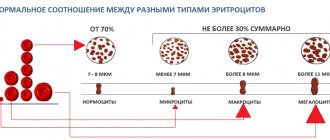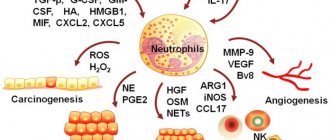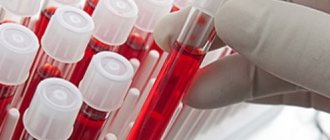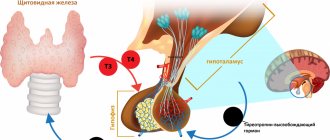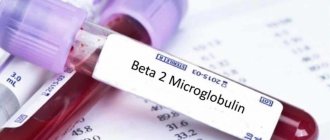Pyelonephritis
Colpitis
Thyrotoxicosis
Menopause
14184 15 October
IMPORTANT!
The information in this section cannot be used for self-diagnosis and self-treatment.
In case of pain or other exacerbation of the disease, diagnostic tests should be prescribed only by the attending physician. To make a diagnosis and properly prescribe treatment, you should contact your doctor. We remind you that independent interpretation of the results is unacceptable; the information below is for reference only.
Progesterone: indications for use, rules for preparing for the test, interpretation of results and normal indicators.
Detailed description of the study
Progesterone is a female steroid hormone produced by the corpus luteum of the ovaries and, during pregnancy, by the placenta. The concentration of progesterone in the blood is determined to confirm or exclude ovulation during the menstrual cycle. The maximum concentration of progesterone is observed in the luteal phase of the cycle.
Produced by the corpus luteum of the ovaries. A progesterone test is prescribed to identify the causes of infertility, determine the presence of ovulation, diagnose an ectopic or pathological pregnancy, and to monitor the condition of the fetus and placenta during pregnancy in the presence of complications. The main function of the hormone estradiol is to prepare a woman’s body for pregnancy. Each month, estrogen causes the inner lining of the uterus, the endometrium, to grow and renew itself, while luteinizing hormone (LH) causes one of the ovaries to release an egg. In place of the released egg, the so-called corpus luteum is formed, which produces progesterone. Progesterone, together with the hormone secreted by the adrenal glands, stops the growth of the endometrium and prepares the endometrium of the uterus for the implantation of a fertilized egg, and after its implantation helps to maintain pregnancy: it suppresses the activity of the smooth muscles of the uterus, maintains the dominance of pregnancy in the central nervous system; stimulates the development of the terminal secretory sections of the mammary glands and the growth of the uterus, the synthesis of steroid hormones; has an immunosuppressive effect, suppressing the reaction of rejection of the fertilized egg. Stimulates sebum secretion. If fertilization does not occur, the corpus luteum disappears, progesterone levels drop and menstrual bleeding occurs. If the fertilized egg attaches to the wall of the uterus, the corpus luteum continues to produce progesterone. After a few weeks, the placenta takes over the function of the corpus luteum to produce progesterone, being the main source of this hormone during pregnancy.
An increase in progesterone concentration occurs during pregnancy, tumors of the adrenal glands and testicles, hydatidiform mole, and ovarian chorionepithelioma. A decrease in hormone levels occurs when there is a threat of miscarriage, galactorrhea-amenorrhea syndrome, taking oral contraceptives and certain medications.
Indications for the purpose of the study
Progesterone is a natural steroid hormone, synthesized in the ovaries, testicles, adrenal cortex, and during pregnancy - in the placenta.
It is a precursor to sex hormones and corticosteroids.
Women need progesterone so that they can successfully bear and give birth to a child. The hormone ensures the endometrium’s receptivity to the fertilized egg, its implantation and subsequent development. In the first trimester of pregnancy, progesterone increases the threshold of excitability of the muscle fibers of the uterus, which promotes pregnancy. In the second and third trimesters, high levels of progesterone inhibit the contractile activity of the uterus.
Progesterone ensures the ability of the maternal immune system to tolerate the effects of fetal antigens, which helps maintain pregnancy.
Progesterone receptors are found in the endometrium, myometrium, ovaries, mammary glands, as well as in the vascular endothelium, thymus, bones, bronchi, lungs, and pancreas. It has a relaxing effect on the smooth muscles of the uterus, blood vessels, and biliary system. Progesterone promotes the growth and development of glandular tissue of the mammary gland and blocks the secretion of milk by the mammary gland during pregnancy.
Progesterone affects brain structures (hypothalamus, pituitary gland, etc.) and affects the cognitive process, memory, emotions, sexual behavior, body temperature. Progesterone protects against bone loss.
Outside of pregnancy, progesterone promotes the transformation of the endometrium from a state of proliferation (tissue growth through cell multiplication by division) to a state of secretion (the process of releasing chemical compounds from the cell), promotes the rejection of the endometrium and the onset of menstruation.
Thus, a blood test for progesterone in women is prescribed:
- in case of irregularities in the menstrual cycle or absence of menstruation for a long time to identify the causes of the disorders;
- for pain in the mammary glands or regular pain in the lower abdomen;
- to identify the causes of infertility and miscarriage;
- with heavy bleeding from the vagina;
- to assess the condition of the placenta in the second half of pregnancy;
- to identify the causes of post-term pregnancy.
Progesterone in men is synthesized primarily in the testicles and is a precursor to such important hormones as neurosteroids, testosterone, cortisol, and aldosterone.
Progesterone prevents the proliferation of prostate tissue and the development of cancer. In addition, it controls blood sugar levels, affects nervous activity, normalizes the functioning of the thyroid gland, prevents an increase in estrogen levels, improves sleep, and keeps the skin in good condition.
Violation of progesterone levels in men can manifest as metabolic disorders, create preconditions for female-type obesity, causeless depression, drowsiness, sudden mood swings, headaches, fatigue, irritability, testicular atrophy, and decreased blood pressure. Changes in the level of progesterone in the blood also negatively affect sexual desire.
Thus, a doctor can give a man a referral for a blood test for progesterone:
- with signs of imbalance of hormones in the body (enlargement of the mammary glands of the female type (gynecomastia), loss of muscle mass, hair loss on the head and body, decreased libido, problems with ejaculation, erection, lack of calcium in the body, frequent mood changes, sharp fluctuations in body weight, the appearance of excess weight);
- if you suspect prostate cancer, tumors of the adrenal glands or testes;
- to monitor already prescribed therapy.
In children, a progesterone test is prescribed for abnormalities in the production of sex hormones.
How to take a progesterone test
In order for the determination of progesterone concentration to be as accurate as possible, it must be taken on certain days of the menstrual cycle. It must be remembered that the indicators for a non-pregnant and pregnant woman will be different. To interpret the results obtained, it is recommended to contact your doctor.
When should you take a progesterone test?
Blood is donated for progesterone if there are certain indications. After consulting a doctor, the specialist determines the need for research.
The main reasons for the analysis are irregular periods, infertility, pathological bleeding from the genitals and pregnancy.
On what day of the cycle is a progesterone test taken?
Women are advised to take a progesterone test on certain days of the menstrual cycle. The optimal period is considered to be from 21 to 23 days. In this case, the regularity of menstruation is considered an important factor. During pregnancy, the day of the test is not important.
Test for progesterone during pregnancy
During pregnancy, the value of progesterone changes according to the trimester. Maximum hormone values can be determined towards the end of gestation. For pregnant women, it does not matter what day to take the test.
- In the 1st trimester, the concentration of progesterone is 34-140 nmol/l.
- The 2nd trimester is accompanied by a possible increase in values to 80-265 nmol/l.
- By the end of pregnancy, the concentration of progesterone is 186-680 nmol/l.
What is progesterone
Progesterone is a hormone of the female reproductive system, the synthesis of which occurs cyclically throughout the ovarian-menstrual cycle. The place of its synthesis is the woman’s ovaries, as well as the placenta during pregnancy.
The effects of this steroid substance in the female body are:
- Secretory transformations of the endometrium in the luteal phase. What does this mean? Due to estrogens, which are synthesized in the first phase of the cycle, active growth of the uterine mucosa occurs. Progesterone, on the contrary, has an antiproliferative effect. That is, it inhibits the growth of the endometrium, but ensures its secretory transformations (accumulation of glycogen in cells to ensure the trophic function of the embryo during pregnancy).
- Sedative effect.
- Relaxation of smooth muscle muscles (including the body of the uterus to maintain pregnancy). but progesterone, on the contrary, spasms the cervix, preventing the development of isthmic-cervical insufficiency during pregnancy.
- Transformations in the mammary glands to ensure lactation.
Causes of elevated progesterone levels:
- Presence of pregnancy;
- Hormonally active ovarian tumors;
- Chorionepithelioma;
- Bubble drift.
Reasons for decreased levels of the hormone progesterone in the blood:
- Luteal phase deficiency;
- Frozen (non-developing) pregnancy;
- Taking combined oral contraceptives.
When is it necessary to donate blood to check progesterone levels?
Since progesterone is a hormone, the level of which depends on the phase of the ovarian-menstrual cycle, therefore it is necessary to take it on certain days. If a woman is of reproductive age, and her cycle averages about 28 days, then the recommended interval for donating blood to check progesterone levels is days 21-23 of the ovarian-menstrual cycle.
The main functions of progesterone
- ensures the growth of glands in the uterine mucosa in the second half of the menstrual cycle;
- responsible for the regularity of menstruation;
- reduces the effects of estrogen;
- supports libido;
- its deficiency has a bad effect on a woman’s appearance;
- participates in the production of other steroids as an intermediate key link;
- thickens the mucus of the cervical canal, making it impermeable to sperm;
- promotes better embryo implantation by suppressing the immune system. Thanks to this, the embryo is not rejected by the mother’s body, and pregnancy occurs;
- inhibits lactation before the onset of labor, and a decrease in progesterone levels after the birth of a child is a signal for the production of prolactin;
- in the first trimester it suppresses spontaneous uterine contractions, relaxes the muscles of the uterus, protects the fertilized egg from rejection until the period of full formation of the feta-placental complex;
- probably, a decrease in progesterone concentration is the reason for the onset of labor;
- is a neurosteroid - affects the functioning of the brain;
- at the level of the central nervous system it helps to endure pregnancy and childbirth more easily.
Preparing for a hormone test
The amount of hormones in the blood depends on the time of day, since there is a daily rhythm of secretion (release of hormones). Blood for hormonal analysis should be taken in the morning, on an empty stomach.
In women, hormonal levels also depend on the stage of the menstrual cycle. The most favorable days for analysis are days 5-7 of the cycle, starting from the first day of menstruation.
On the eve of the test, you should not drink alcohol, and you should also avoid increased physical activity and stressful situations. It is advisable not to smoke for an hour before the test.
A week before the test, you must stop taking hormonal medications. If you are prescribed medication, discuss this with your doctor; the test may have to be postponed.
How to donate blood for hormones. Interpretation of analysis results.
Blood from a vein is used to test hormones.
Depending on the clinical signs indicating a specific pathology, an analysis with tests for specific hormones is usually prescribed.
The most complete picture of your health can be obtained by taking a test for the following hormones.
Thyroid hormones:
- T3 (triiodothyronine)
free – stimulates oxygen metabolism in tissues. Normal values: 2.6 - 5.7 pmol/l. - T4 (thyroxine)
– stimulates protein synthesis. Normal values: 0.7-1.48 ng/dl. - Antibodies to thyroglobulin (AT-TG)
are an important parameter for identifying a number of autoimmune diseases. Normal values: 0-4.11 U/ml. - Some others
.
Pituitary hormones:
- TSH (thyroid-stimulating hormone)
– stimulates the production of thyroid hormones (T3 and T4). Normal values: 0.4-4.0 mU/l. An elevated TSH value usually indicates decreased thyroid function. - FSH (follicle stimulating hormone)
. Normal values: in women - depends on the phase of the menstrual cycle. Phase I – 3.35-21.63 mU/ml; Phase II – 1.11-13.99 mU/ml; postmenopause – 2.58-150.53 mU/ml; girls under 9 years old 0.2-4.2 mU/ml. In men – 1.37-13.58 mU/ml. - LH (luteinizing hormone)
. Normal values: in women - depends on the phase of the menstrual cycle. Phase I – 2.57-26.53 mU/ml; Phase II – 0.67-23.57 mU/ml; postmenopause – 11.3-40 mU/ml; girls under 9 years old - 0.03-3.9 mU/ml. In men – 1.26-10.05 mU/ml. - Prolactin
.
The main function is to stimulate the development of mammary glands and lactation. Normal values: in women (from the first menstruation to menopause) – 1.2-29.93 ng/ml; in men – 2.58-18.12 ng/ml. Increased concentrations of prolactin are called hyperprolactinemia
. There are physiological and pathological hyperprolactinemia. Physiological hyperprolactinemia can be caused by breastfeeding, pregnancy, severe physical activity, and stress. An increased concentration of prolactin in women leads to menstrual irregularities and may cause infertility. In men, hyperprolactinemia leads to decreased libido and impotence. - ACTH (adrenocorticotropic hormone)
– stimulates the synthesis and secretion of hormones from the adrenal cortex. Normal values: 9-52 pg/ml. - Some others
.
Sex hormones:
- Testosterone
(male sex hormone) is produced by the adrenal glands and in the gonads (in men - in the testicles, in women - in the ovaries). Affects the development of the genital organs, the formation of secondary sexual characteristics, the growth of bones and muscles. Normal values: for men - 4.94-32.01 nmol/l, for women - 0.38-1.97 nmol/l. - Estrogens
(female sex hormones). The main estrogens - progesterone and estradiol - are produced by the adrenal glands and ovaries. Normal values of progesterone in women depend on the phase of the menstrual cycle: Phase I – 1.0-2.2 nM/l; Phase II - 23.0-30.0 nM/l; for postmenopause – 1.0-1.8 nM/l. Similarly for estradiol: phase I - 198-284 pM/l: phase II - 439-570 pM/l; for postmenopause – 51-133 pM/l. Elevated estrogen levels may indicate tumors of the ovaries and adrenal cortex, as well as cirrhosis of the liver. Reduced - for insufficient development and sclerosis of the ovaries.
Adrenal hormones:
- DEA-s (dehydroepiandrosterone sulfate)
is necessary for the synthesis of testosterone and estrogens. The normal range for the concentration of this hormone is: 3591-11907 nmol/l; in women – 810-8991 nmol/l. However, this is the general picture; when processing analysis data, the patient’s age must also be taken into account. - Cortisol
is involved in many metabolic processes and is actively produced as a result of the body’s response to hunger or stress. Normal values: for children under 16 years of age - 3-21 mcg/dl, for an adult - 3.7-19.4 mcg/dl. - Aldosterone
is responsible for regulating water-salt balance in the body. Normal values: 35 - 350 pg/ml.
Indications
Experts identify the following indications for which it is necessary to determine the concentration of progesterone:
- Irregularity of the menstrual cycle or its complete absence.
- Infertility of unknown origin.
- Presence of bleeding from the genitals.
- Monitoring the condition of the placenta in the second and third trimester of pregnancy.
- Determining the reasons for post-term pregnancy.
A correctly determined progesterone concentration helps to determine the causes of pathology and correct them in a timely manner.
Blood test for hormones when planning pregnancy
It is very important to take a blood test for hormones when planning a pregnancy. Timely assessment of hormonal levels will help avoid possible problems.
The main hormones that are checked when planning pregnancy:
- FSH (follicle-stimulating hormone)
- in women, is responsible for the growth of the egg (follicle) in the ovary. In men, it is one of the main sex hormones that regulate reproductive function. - LH (luteinizing hormone)
- in women, ensures completion of the maturation of the egg in the follicle and subsequent ovulation (rupture of the follicle and release of the egg). In men, it affects the maturation of sperm. - Prolactin
– stimulates lactation after childbirth. During pregnancy, it reduces the release of FSH. If there is no pregnancy, an increased amount of prolactin can lead to a pathological deficiency of FSH and prevent conception. - Estradiol
- affects all female genital organs. - Progesterone (pregnancy hormone)
is produced after the egg matures. Without this hormone, a fertilized egg cannot attach to the uterus. Lack of progesterone can cause miscarriage. - Testosterone
is a male sex hormone; an increased amount of testosterone in women can lead to miscarriage, and a decreased amount in men can lead to decreased sperm quality. - DEA sulfate
(DEA-s or DEAS) is produced in small quantities in the body of women. Increased concentrations of this hormone can lead to infertility. - Thyroid hormones.
Thyroid dysfunction can also cause infertility.
Analysis transcript
It takes about a day to decipher the results of the analysis. The next day after the study, the doctor issues a conclusion about the concentration of progesterone in the blood. It can be increased, decreased or have a normal value.
Pathologies in which progesterone levels are increased
An increase in progesterone is possible with the following pathologies:
- The presence of dysfunctional uterine bleeding.
- Absence of menstruation due to another disease.
- Tumor-like formations of the ovaries or testicles.
- Functional kidney failure.
- Neoplasms in the area of the adrenal glands.
During pregnancy, progesterone may be elevated under the following conditions:
- Bubble drift.
- Untimely maturation of the placenta.
- Pathology of the fetoplacental complex.
Pathologies in which progesterone levels are reduced
If after the study a decrease in the amount of progesterone in the blood is determined, this may indicate the following pathological conditions:
- Increasing the amount of estrogen in the body.
- Lack of ovulatory processes.
- Uterine bleeding.
- Absence of menstruation of various origins.
- Functional failure of the genital organs.
- Taking certain medications that help lower progesterone.
- Exacerbation of chronic inflammatory diseases of the genital organs.
The pregnancy period may be accompanied by a decrease in the amount of progesterone in the presence of a threat of miscarriage, insufficient development of the placenta, intrauterine growth retardation,
Why do you need to know these values?
To prepare for menopause. In addition to prescribing replacement therapy, a woman should introduce calcium-containing foods into her diet: cottage cheese, fermented milk products, cheese to prevent osteoporosis. You need to undergo a gynecological examination: take a smear for oncocytology, do an ultrasound of the pelvic organs and mammography. You should donate blood for sugar and cholesterol levels. Adjust your diet, move more, follow a sleep and rest schedule. Your doctor may prescribe vitamins or supplements to relieve menopausal symptoms.
Obstetrician-gynecologist of the highest category. Chernovskaya Rosa Uranovna
